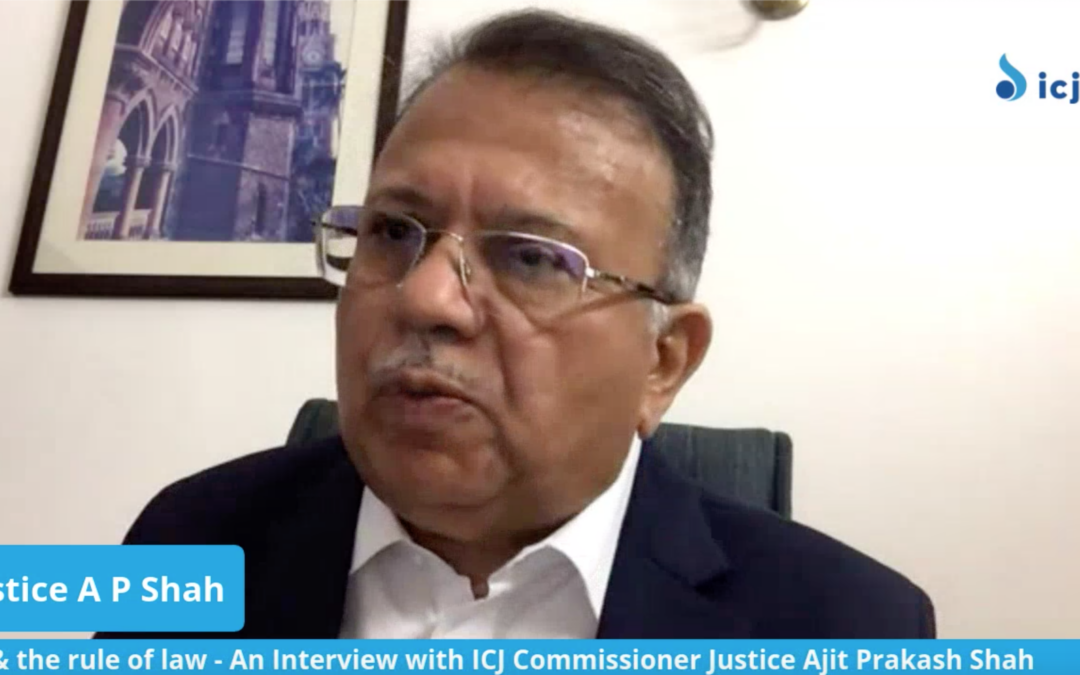
India: ICJ Commissioner Justice Ajit Prakash Shah discusses the responsibility of the Courts in upholding human rights during COVID-19 pandemic
In a wide-ranging interview recorded on June 4 2020, ICJ Commissioner and former Chief Justice of the High Court of Delhi, Ajit Prakash Shah, called on the Indian judiciary to exercise its responsibility to protect peoples’ human rights and “reprise its role as protector of Indian people” in the context of the Covid-19 epidemic.
In April and May 2020, the Indian Supreme Court dismissed several petitions and applications concerning the rights of internal migrant workers.
These included petitions demanding that migrant workers be moved to shelter homes and provided with basic needs and that payment of minimum wages be made to all migrant workers for the lockdown period.
The Court was also requested to direct the District Magistrates to identify those who are walking and ensure that they are provided with shelter and food and reach their destination, following the death of 16 internal migrant workers killed while sleeping on railway tracks while on their way back to their hometowns.
Finally, on 26 May 2020 the Court took suo moto cognizance of their predicament and, on 28 May 2020 ordered the Government to: register internal migrant workers; provide internal migrant workers free transportation home; and provide internal migrant workers with shelter, food, and water until they reach their homes.
This action was followed by another order on 9 June by which the Court ordered that: internal migrant workers are identified and sent to their hometowns within 15 days; and that all cases registered against those who had allegedly violated COVID-19 lockdown orders be considered for withdrawal.
In the interview, Justice Shah accented, in particular, the role of the Indian judiciary “as protector of Indian people” in respect of marginalized and disadvantaged people, including people living in poverty.
In addressing the question about internal migrant workers who were stranded during the recent COVID-19 lockdown, Justice Shah observed that for two months (March 24 2020 – May 28 2020) between the initiation of the lockdown and the rulings of the Supreme Court the Court appeared to have “remained skeptical” and in “denial” about petitions filed seeking redress for internal migrant workers.
Speaking in this context, Justice Shah reminded the Indian judiciary that Indian courts have historically been at “the forefront of giving effect to India’s international legal obligations,” including its economic, social, and cultural rights obligations encapsulated in International Covenant on Economic, Social and Cultural Rights.
They had done so in landmark cases such as PUCL v. UOI (in which it held that the right to life with dignity includes a right to food and a right to be free from hunger and starvation) and Chameli Singh v. UOI (in which it held that right to shelter includes adequate living space includes light, air, water, civil amenities, and sanitation).
While commending the Courts interventions in May 2020, Justice Shah pointed out that their lateness to react was damaging.
“Courts should have intervened earlier. They could have monitored the process of the return of the migrants to their home states and ensured basic wages were fixed and delivered.”
Justice Shah expressed hope that the 28 May 2020 order represented a turning point:
“Hopefully, going forward, the Court will act in the same spirit … to grant some reliefs to suffering migrant communities. In the future, the Court should take the lead and monitor these processes, serving as a guide to both the center and the state authorities and the bureaucracy for addressing these issues.”
Commenting on the role of lawyers during the COVID-19 crisis, Justice Shah expressed concern that law officers were castigating lawyers for approaching courts with petitions.
Watch the video
Additional Reading
- Briefing Papers
- Press Release: COVID-19: Indian authorities must act immediately to protect internal migrant workers stranded under intolerable conditions
Download (with additional information)




